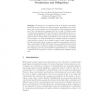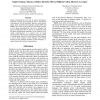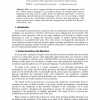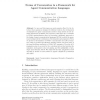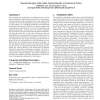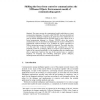135
click to vote
AAMAS
2000
Springer
15 years 1 months ago
2000
Springer
This article examines the issue of developing semantics for agent communication languages. In particular, it considers the problem of giving a
104
click to vote
AAMAS
2007
Springer
15 years 2 months ago
2007
Springer
We describe our preliminary work in modeling conversation specifications and policies as positive/negative permissions and obligations. Our model is generic as it is independent o...
136
click to vote
ICMAS
1998
15 years 3 months ago
1998
This paper examines the issue of developing semantics for agent communication languages. In particular, it considers the problem of giving a verifiable semantics for such language...
110
click to vote
AAAI
2000
15 years 3 months ago
2000
Group communication is the core of societal interactions. Therefore, artificial agents should be able to communicate with groups as well as individuals. However, most contemporary...
104
click to vote
ISICT
2003
15 years 3 months ago
2003
When we start to engage machines in conversation, what language will it be? While natural language is our preferred means of communication, natural language processing is by no mea...
116
click to vote
DAGSTUHL
2007
15 years 3 months ago
2007
Abstract. In open and heterogeneous environments offered by the Internet, where agents are designed by different vendors, the development of standards for agent communication nee...
129
click to vote
ACOM
2006
Springer
15 years 4 months ago
2006
Springer
Abstract. There are two main traditions in defining a semantics for agent communication languages, based either on mental attitudes or on social commitments. In this paper, we tran...
114
click to vote
ECAI
2006
Springer
15 years 5 months ago
2006
Springer
One of the most important aspects of the research on agent interaction is the definition of agent communication languages (ACLs), and the specification of a proper formal semantics...
119
click to vote
ATAL
2007
Springer
15 years 6 months ago
2007
Springer
We investigate the properties of a multiagent system where each (distributed) agent locally perceives its environment. Upon perception of an unexpected event, each agent locally c...
101
click to vote
COLLABORATION
1999
Springer
15 years 6 months ago
1999
Springer
The paper presents the computational model underlying new agent communication languages. The model, called STROBE, has been identified and two prototypical languages inspired by th...

